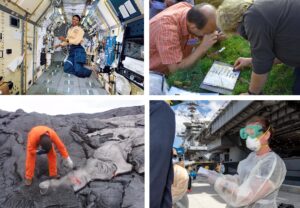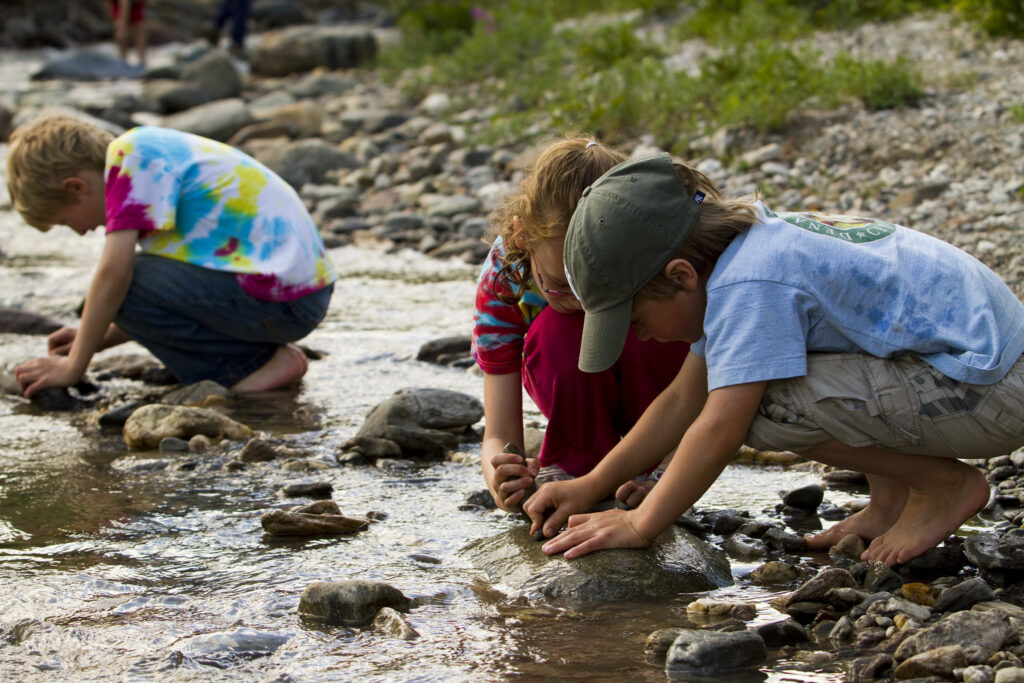The word “science” probably brings to mind many different pictures: a fat textbook, white lab coats and microscopes, an astronomer peering through a telescope, a naturalist in the rainforest, Einstein’s equations scribbled on a chalkboard, the launch of the space shuttle, bubbling beakers …. All of those images reflect some aspect of science. But none of them provides a full picture because science has so many facets:
 Science includes many diverse activities and topics. Photo credits: Flickr user NASA on The Commons, imaggeo and Cezary Kabala, Flickr user U.S. Geological Survey, and Flickr user U.S. Indo-Pacific Command.
Science includes many diverse activities and topics. Photo credits: Flickr user NASA on The Commons, imaggeo and Cezary Kabala, Flickr user U.S. Geological Survey, and Flickr user U.S. Indo-Pacific Command.
- Science is both a body of knowledge and a process. In school, science may sometimes seem like a collection of isolated and static facts listed in a textbook, but that’s only a small part of the story. Just as importantly, science is also a process of discovery that allows us to link isolated facts into coherent and comprehensive understandings of the natural world.
- Science is exciting. Science is a way of discovering what’s in the universe and how those things work today, how they worked in the past, and how they are likely to work in the future. Scientists are motivated by the thrill of seeing or figuring out something that no one has before.
- Science is useful. The knowledge generated by science is powerful and reliable. It can be used to develop new technologies, treat diseases, and deal with many other sorts of problems.
- Science is ongoing. Science is continually refining and expanding our knowledge of the universe, and as it does, it leads to new questions for future investigation. Science will never be “finished.”
- Science is a global human endeavor. People all over the world participate in the process of science. And you can too!
Science for all
The process of scientific discovery is not limited to professional scientists working in labs. You engage in scientific thinking every day and may not even realize it. The experience of deducing that your car won’t start because of a bad fuel pump, or of figuring out that the centipedes in your backyard prefer shady rocks shares fundamental similarities with classically scientific discoveries like working out DNA’s double helix. These activities all involve making observations and analyzing evidence — and they all provide the satisfaction of finding an answer that makes sense of all the facts. In fact, some psychologists argue that the way individual humans learn (especially as children) bears a lot of similarity to the progress of science: both children and scientists make observations, consider evidence, test ideas, and hold on to the ideas that work.
 Kids learn about the natural world by making observations. Photo credit: Flickr user Denali National Park and Preserve.
Kids learn about the natural world by making observations. Photo credit: Flickr user Denali National Park and Preserve.
Some scientific questions might seem complex (e.g., What chemical reactions allow cells to break the bonds in sugar molecules?), but they don’t have to be. You’ve probably posed many perfectly valid scientific questions yourself: how can airplanes fly, why do cakes rise in the oven, why do apples turn brown once they’re cut? You can discover the answers to many of these science questions in your local library or investigate them yourself. But many others have not yet been answered by science and could yet lead to astonishing new discoveries. There is a lot we have left to learn about how the world works. For example, we still don’t know much about how your brain remembers to buy milk at the grocery store. Plenty of everyday questions that might pique your curiosity are also the topic of ongoing scientific research.


You must be logged in to post a comment.